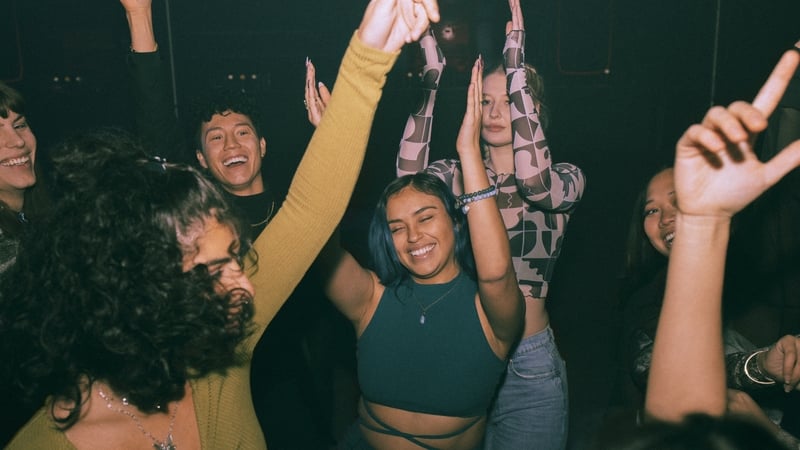With rates of spiking, stalking and harassment going up, many feel too unsafe to express themselves creatively in nightclubs or bars. Meg Bergin wants to change that. Kate Demolder writes.
Walking in for the first time to a great club will always be a special moment. In my teens, there were many times where dark rooms with dancefloors felt like the only rooms I could express myself in, or indeed make friends with people I wouldn't usually meet.
There were kind girls in bathrooms, interesting boys who weren’t afraid to let go, and groups of people who would hang on your every word––even when feeling special didn’t feel like it belonged to you anymore.
In recent years, with the rise of spiraling rents and avaricious developers, these spaces were routinely squeezed out of Irish culture, to the point where some four in five are now permanently closed.
(Personally, the two nightclubs I used to attend to find aspects of myself I couldn’t find in my school, friend group or home, are now dead and gone––either replaced with overpriced, soulless, franchised pubs or vacant, empty air.)
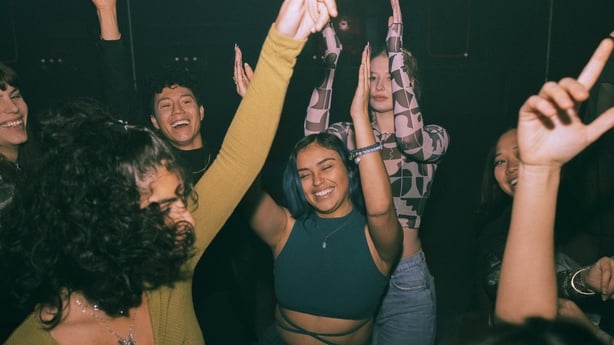
For fans of the physical communities that come from clubbing and dance floors, the refusal to be flattened by commercial and capitalistic endeavours rings loudly. These regulars have attempted the seemingly impossible: modeling a politics of care, and deploying harm-reduction strategies and vigilantly policing harassment on the dance floor, even when spaces don’t feel entirely catered to them.
When Meg Bergin, a 20-something Dubliner with waist length hair and a penchant for self-love, found herself frightened and horrified by rumours of needle-spiking and gendered abuse in 2022, she thrust herself into the spotlight of club promoting, by setting up The Girls Room, a regular event for women and non-binary people.
Bergin has just closed the group’s 12th event when we speak. "There was just a lot of stuff going on regarding women's safety at the time," she says from her home via Zoom.
"Girls being spiked and harassed in nightclubs... And then just on a day to day level as well––women being attacked and murdered. And that essentially sparked it, just the thought that we all have so much grief and anxiety around leaving the house, to the point where so many women I know just stopped doing things collectively.
"It got me thinking about safe spaces, and whether they existed for us. Was there anywhere for us to connect, celebrate each other, express ourselves or even somewhere where we weren’t perceived so heavily? I started fixating on that, and then brainstormed. The first event was in June, and the rest is history."
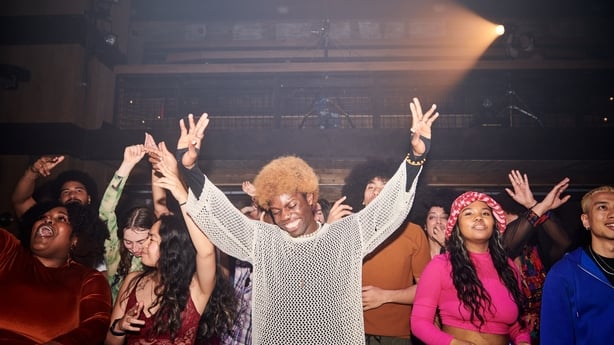
The Girls Room, of which Bergin is founder, is a sporadic, ticketed ("usually under €15, but early bird tickets exist for those with lower incomes") event resplendent with DJs, musical acts and pop-up shops for women and non-binary people to attend in fearlessness.
An average night—which might see photo-booths and stick and poke tattooists populate the venue––sees between 170 and 240 in attendance, with the premise centering around an inherently feminist one: GIRLS JUST WANT TO HAVE FUN-DAMENTAL RIGHTS. (The phrase features heavily in the event’s recent promotional material.)
A central tenet to its existence is their zero-tolerance policy on harassment and discrimination, something they routinely ask patrons to give feedback upon to ensure it’s proficiency.
"We also have, what we call, consent wristbands," she says. "So you get a pink wristband if you’re open to meeting someone romantically, and a green one if you wanna make new pals. And it’s kind of a given that if someone’s not wearing one, they want to be left alone."
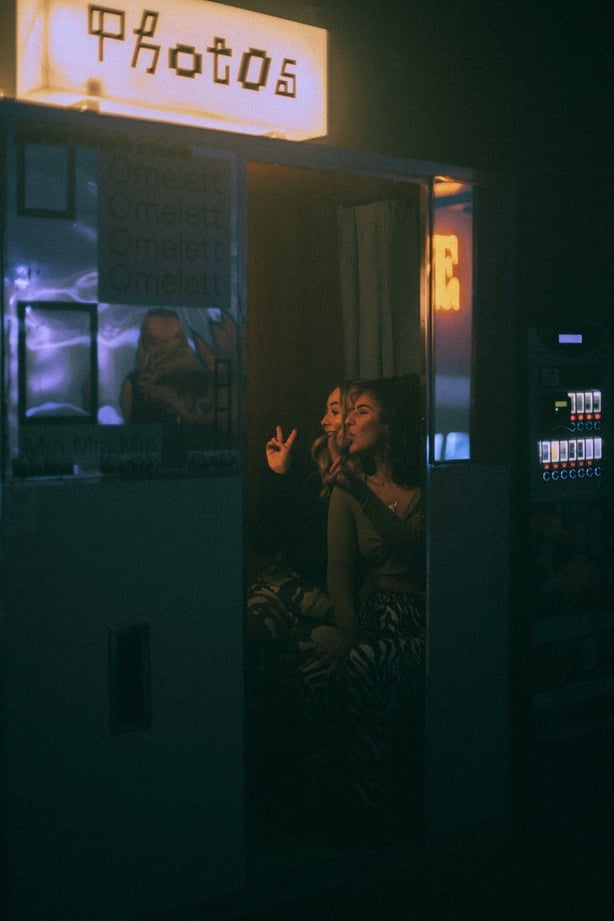
Before every event, Bergin sets up a group chat with all attendees, to create a community, encourage friendships and ensure everyone has safe way home.
"I usually get people to let me know if they live in a certain area, so they can all bundle up and go home together. Because I know that can be a really daunting part of the night, getting a taxi or bus home alone, so I wanted to make that easier. Especially because it’s not taken as seriously as it should be––but it’s so important. When you feel safe, you can be present in your body and you can fully enjoy your experience. I think that's the major difference."
Nightclubs can be liberating, electrifying, transformative spaces. They also can be daunting and terrifying. According to a 2022 report compiled by the Central Statistics Office (CSO), 39% of Irish women have experienced sexual violence––defined as 'a range of non-consensual experiences, from non-consensual sexual touching to non-consensual sexual intercourse’––as an adult, with the statistics showing that the most likely locations for these acts are pubs, clubs and discos. Other worrying results of the survey reveal that one in ten experienced sexual violence in the last year.
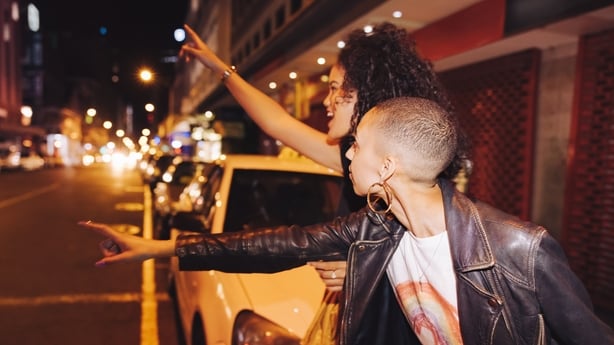
For younger adults, aged 18-24, the rate was more than three times greater. Indeed, when schoolteacher Ashling Murphy was murdered near her home in 2022, it seemed to me that every woman who read about her felt like they couldn’t leave the house again. Much less, to a dark room, where strangers are drinking, and close.
But it’s not just one demographic affected: from the CSO study, it was found that members of the LGBTQIA+ community and people with disabilities were more regularly affected by sexual violence than heterosexual people. And after groups set fire to places of refuge for asylum seekers in Donegal and Galway, debates about racism in the scene intensified, too.
When Harriet*, an openly pansexual woman, was in a relationship with another woman, "the staring and groping was so intimidating and overwhelming in club environments as these taller and physically bigger men could easily overpower both of us. Coming back from nights out was terrifying as well; there was one night in particular when a man walked past us and stared us down until we got into my house."
"Spaces where patrons feel safe are just so needed," Bergin says. "I had this vision in my head that it would be so healing for so many, having a space where people can dance and be together in a safe way. Giving people that autonomy and freedom that you can’t feel everywhere can be really transformative."
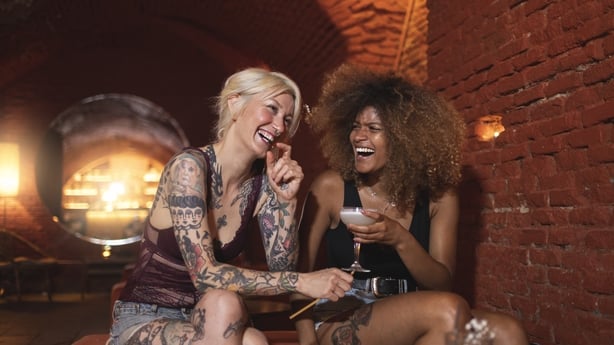
Creating female-only space to protect patrons is not new; women-only gyms, office spaces and even comedy nights are regular enough to appear uncontroversial. But when it comes to nightclubs, it seems that only two previous formats existed; LGBTQ+ clubs, and ‘ladies nights,’ held in male-centric establishments, which I believe sought to get girls in to be viewed by way of the male gaze.
Events like these rarely catered to women in a way that The Girls Room, and a growing cohort of other female-centric spaces––like activist Teddy Edwardes’ club night LICK in London––do. Here, women are entirely separated from sexism, misogyny and the societal rules that bind them.
"It's very easy to make assumptions that it's [The Girls Room] an exclusionary space and that it's anti-men," Bergin says. "That's not the case at all. In fact, in all the marketing and promo we’ve done, men aren’t mentioned at all. It’s about women and non-binary people to have a community and outlet, because they’re not afforded one elsewhere. That’s all it is."
Space, as a conceptual notion, is not a neutral territory. It is politicised in class, locational and gendered terms, so much so that the rich live in spaces that are systemically unavailable to the poor, and men exist in places systemically unavailable to women and queer people.
A number of spaces still present today have been culturally, religiously and politically marked as either male or female, with many of the latter linked by way of women’s breeding and feeding functions; nurseries; school pick-up; supermarkets; GP waiting rooms. (The spaces we refer to as public––where key decisions relating to power are deliberated and implemented––are all assumed to be male, a process which routinely led and leads women out of the decision making process.)
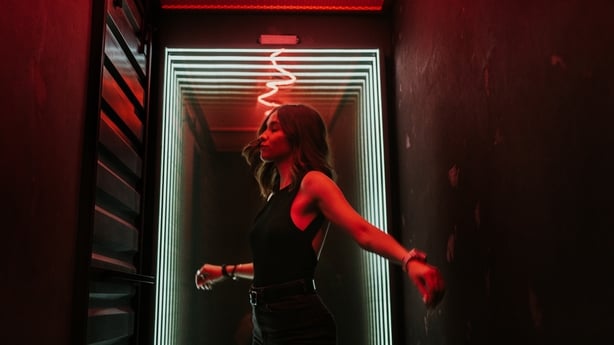
When women occupy public spaces, and cast off the old patriarchal myths about what a woman can and can’t be, they have the opportunity to become powerful and autonomous in a way that feels uncomfortable to some. Oftentimes they’re accused of being man-haters and of acting in exclusionary ways.
Research suggests that women are also socialised from childhood to blame themselves if anything in their ecosystem is considered faulty; from being undesirable, to keeping an unclean home, to sexual assault. Because of this, it seems that both men and women can falter if they are socialised to believe that women should not be believed when they say they are raped.
However, the future is looking brighter: as per that same CSO study, almost nine in 10 adults disagreed with the statement: "If a person who has been raped is not visibly upset by the experience, it probably was not rape" (the rate for men and women was similar, at 88% and 86% respectively); and those aged 65 and over were three times more likely to agree with the statement: "Women often make up or exaggerate reports of rape" compared with those aged 35-44, at just 5%.
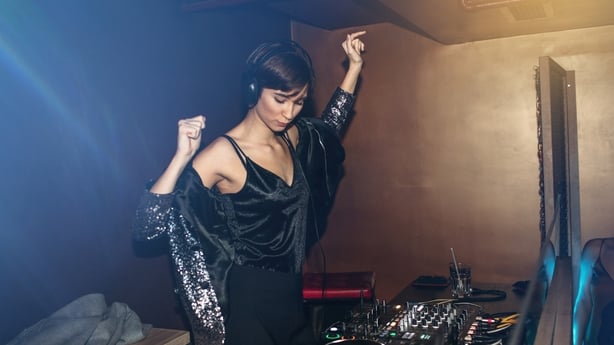
"I’ve been told multiple stories of people being spiked, groped, harassed, not feeling safe in their gender expression, or whatever else in nightclubs," Bergin says. "Look at any stats––this stuff happens. All I wanted was to create a space where that didn’t happen, and also a place where we could celebrate women and non-binary people, because that doesn’t happen enough."
As for selling tickets, Bergin takes a small cut from the leftovers after paying her photographers, DJs, venue and insurance. But it’s negligible, she says. And also, not the point.
"I’m never really looking at ticket sales," she says. "More about maintaining a feeling and a space. That’s always the most important thing to me. I lead with my heart, and I think anyone who has attended The Girls Room can see that."
*Name has been changed for privacy.
If you have been affected by issues raised in this story, please visit: www.rte.ie/helplines.
The views expressed here are those of the author and do not represent or reflect the views of RTÉ.
